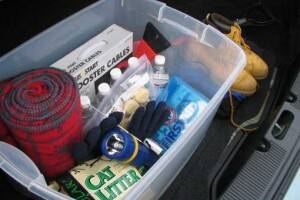Be Prepared to Survive Winter Weather
Earlier this winter Polar Vortex blanketed the Midwest, followed by subsequent days of below-zero temperatures and dangerous wind chills. Most recently, our region has been hit by a serious of blizzards. These winter weather events remind us just how important it is to carry a Winter Weather Emergency Kit.
You might think, “I’m just driving 10 miles down the road to check on pigs at another farm.” or “I’ll just run into town for a few supplies.” During inclement weather, it doesn’t matter if you’re whether you’re one mile or 100 miles from home. You can get stranded anywhere, particular in the rural areas many of us travel.
Whiteout conditions are disorienting. Vehicles have been accidentally hit when motorists have lost their bearings and stopped in the middle of the road. Sometimes we decide we can’t go on, but other times our vehicles simply can’t make it through the extreme weather. Whatever happens, it’s best to be prepared to handle the most extreme circumstances.
Keeping a thermal blanket (the one that looks like aluminum foil), as well as a heavy wool blanket plus wool socks in your vehicle is a smart winter survival tactic. Wool helps keep you warm and dry. In fact, wool blankets are commonly used in our ambulances and for winter rescues.
Not only can winter weather be a hazard for travelers, but we also have to watch our bodies for signs of stress while we’re removing snow. Weather like we experienced last week is literally a heart-attack snow because it’s so heavy and wet. Be extremely careful, so you don’t overexert yourself!
I recall hearing a story of a stoic, elderly farmer was determined to shovel to his mailbox to get mail after a heavy wet spring snow. He overexerted himself and passed out on a snowbank. The snowfall that day was extremely heavy, and the wind was blowing fiercely. By the time the ambulance arrived, he was covered with snow. He was wet and hypothermic. Fortunately, this story had a happy ending but not all do. Please take precautions to avoid frost bite and hypothermia situations, even in spring.
March 1 may be just around the corner, but chances are, we’ll experience more snowfall before the grass turns green. Historically in Wisconsin, March is heavy snowfall month. Eleven inches of snow fell here March 7 last year, and snow was on the ground through the end of the month. Watch out for snowdrifts, too.
Be prepared to survive winter until the final flake falls! Throw extra blankets, matches, snacks and other survival tools into your vehicle if you must travel.

